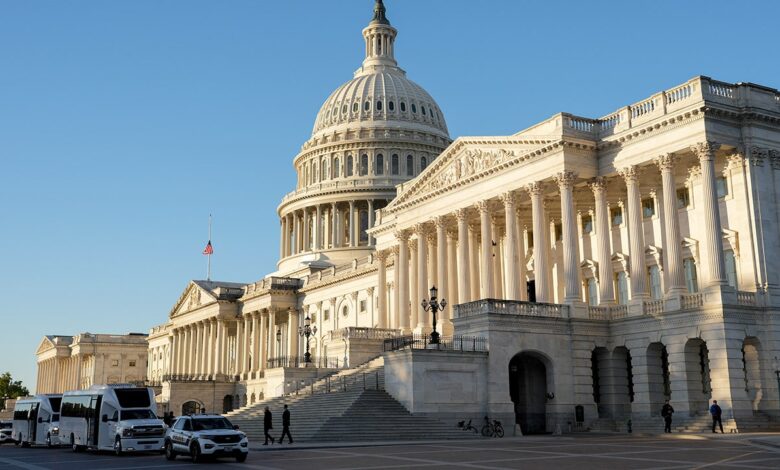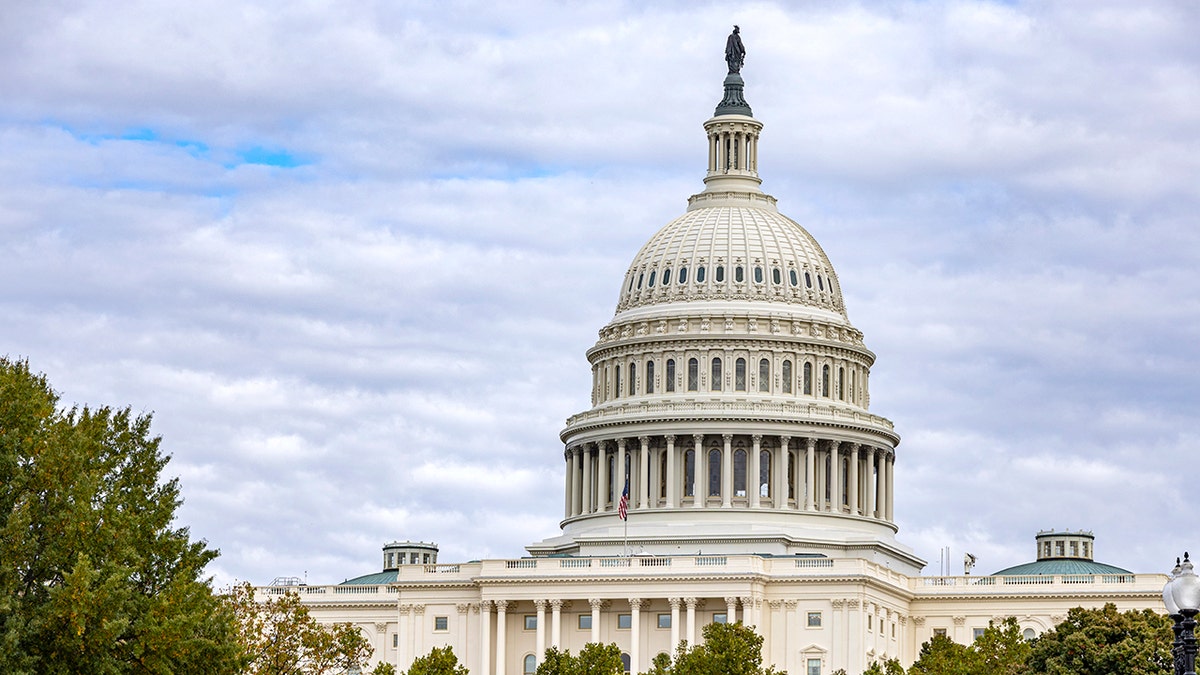Conservative groups oppose Republican civil litigation transparency bill

NEWYou can now listen to Fox News articles!
Republican legislation pending in the House of Representatives aimed at ensuring transparency in civil litigation is raising concerns among some conservative organizations who fear it could dampen donor participation and make it harder for Americans of modest means to hold “woke” businesses accountable.
In a letter sent earlier this week, Tea Party Patriots Action urged the House Judiciary Committee to reject H.R. 1109, introduced by GOP Reps. Darrell Issa, Scott Fitzgerald and Mike Collins, known as the Litigation Transparency Act of 2025.
It aims to ensure greater transparency in litigation, by requiring parties receiving payment in lawsuits to disclose their identities.
VAN JONES ADMITS WAKE WORK ACTIVISM HAS BECOME ‘RIDICULOUS’ AND ‘WE NEED TO GO AWAY’
The letter warns that “the sweeping disclosure requirements contained in this bill threaten our fundamental American principles of privacy, confidentiality, and freedom of expression and association.”
“This legislation would require litigants to preemptively disclose detailed information about private financial arrangements, such as litigation funding agreements, independent of the discovery process and without any finding of relevance by a judge,” said the letter, signed by more than a dozen conservative groups, including America First Legal, Defending Education, Heartland Institute and the American Energy Institute.

The United States Capitol building in Washington, DC on November 5, 2025. (Eric Lee/Bloomberg via Getty Images)
“The bill’s forced disclosure requirements would apply broadly to a number of political organizations, religious groups, law firms, or individual plaintiffs who rely on outside support to assert their rights.
“If passed, H.R. 1109 will have a chilling effect on freedom of speech and association and directly threaten Americans’ privacy rights,” the letter warns. “The end result will be that fewer Americans will have the resources or willingness to come forward with legitimate claims, which threatens to undermine future legal battles on issues crucial to our movement.
“The privacy interests at stake here are not abstract. We have seen how disclosure regimes can be easily weaponized by bad actors, particularly those seeking to attack and intimidate political opponents.”
Issa told Fox News Digital on Wednesday afternoon that there was “misinformation” circulating about what the bill actually proposes to do, and that there would be a “small update tomorrow to clarify one point.”
“What actually happened was that provisions were passed to assure groups that we are not seeking to overturn NAACP v. Alabama or any other historic 501(c) privilege, where you don’t disclose your donor list, etc.,” Issa said. “This is something that Obama and Biden have tried to do repeatedly. We want nothing to do with it. We only ask that if there is a significant financial partner in a lawsuit, that it be disclosed.
“I fully respect and appreciate the concerns of people who want to make sure this doesn’t turn into a burdensome discovery, for example, of hundreds, thousands, or millions of donors to a nonprofit.
“We share the concern of all of these groups, which is that we wanted to make sure that we thought we were on solid ground as it’s written, but very carefully, my team and all parties worked to try to find the simplest and most effective way to say, of course, you don’t have to disclose your donors.”
Supporters of the legislation, including the U.S. Chamber of Commerce, call it “a vital step in ensuring that our legal system remains a tool of justice rather than a playground for hidden financial interests.”
In his press release announcing the legislation in February, Issa said: “Our legislation targets serious and ongoing abuses in our justice system that distort our justice system by obscuring public detection and exploiting loopholes in the law for financial gain.
“Our approach will achieve a much better level of transparency in the courts that people deserve, and that our standard of law requires. We fundamentally believe that if a third-party investor funds a lawsuit in federal court, it should be disclosed rather than hidden from the world and kept from the facts of a case.
The press release explains that hundreds of cases a year involve civil cases funded by undisclosed third-party interests as an investment to obtain a return from hedge funds, commercial lenders and sovereign wealth funds through shell companies and that there are often investor-backed entities that seek large settlements from U.S. companies that end up “distorting the free market and stifling innovation.”
The debate over the legislation reignites an ongoing confrontation between insurers and big companies that have argued that third-party financing gives rise to abusive lawsuits and inflated settlements. Some say there is a need for more transparency about who funds litigation and to limit speculative investments in lawsuits against advocacy-focused nonprofits and legal networks. These groups say they are the only mechanism for those without the financial means to take legal action against well-funded companies.
Many advocacy-focused legal and nonprofit networks simply do not defer charitable donations to trial. Instead, they use structured litigation vehicles, limited liability companies, donor-advised funds or legal defense trusts that cover the costs of a case and are reimbursed, sometimes with interest, if the case wins or is settled. The process is known as non-recourse or outcome-based financing, meaning the investor only gets their money back if the deal goes through.
Bombshell report shows foreign charities poured billions of dollars into US political advocacy groups, ‘eroding’ democracy

A view of the US Capitol in Washington DC (Nicolas Economou/NurPhoto via Getty Images)
Nonprofits like Consumers’ Research have used litigation funding in recent years to combat “woke capitalism” and counter ESG and DEI policies. And the group’s executive director, Will Hild, told Fox News Digital that it was “too easy for big companies to use their outsized influence and powerful market share to push an ideological agenda with little or no recourse.”
Hild told Fox News Digital that he saw the legislation as an “attack” on one of the “few tools Americans have to hold powerful, woke corporations accountable.”
Hild added: “Even worse, it imposes dangerous disclosure mandates that would force plaintiffs to reveal confidential litigation funding agreements. This bill blatantly tilts the scales in favor of woke corporations and makes it much harder for victims to get the resources they need to fight back.
The conservative groups’ letter also expresses concern that “forced disclosure of private financial arrangements would force litigants to reveal the identities of donors, thereby violating donors’ privacy rights and exposing them to threats of harassment and retaliation.”
In a Tuesday opinion article Writing in The Hill opposing the legislation, Alliance Defending Freedom founder Alan Sears pointed to Supreme Court decisions that he said “affirmed that forced disclosure of a private association infringes on fundamental liberties.”
In a statement to Fox News Digital, Rep. Fitzgerald said, “As has been reiterated to these groups in multiple discussions, it remains the intention of Congress to protect the First Amendment rights of those who contribute to political groups and religious organizations, consistent with the Supreme Court’s opinion in Citizens’ United.” »
Organizations that supported the bill have raised concerns about foreign funding in courtrooms, particularly from China, including High Tech Investors Alliance, which said in a press release that it commended the lawmakers who introduced it for “defending American businesses against the exploitation of our courts by foreign adversaries and unscrupulous hedge funds.”
“For too long, a lack of transparency has allowed shell entities to manipulate the legal system to prey on American employers, hiding their predatory practices and the identities of their funders,” HTIA said. “As President Trump takes bold action against the aggressive economic maneuvers of China and other countries, Congress must also act decisively to prevent our judges and juries from becoming tools in economic warfare waged by antagonists.”
CLICK HERE TO DOWNLOAD THE FOX NEWS APP
Leonard Leo, who manages a vast network of conservative nonprofits and is linked to Consumers’ Research, told Politico earlier this year, “while there are areas, like mass tort, where litigation funding has been abused and could be reformed, it has always been an essential tool for the conservative movement to advance the public good by accommodating the woke liberal agenda.”
The House Judiciary Committee did not mark up the bill Tuesday, and Fox News Digital has learned it will be marked up at noon Thursday.
“If someone is acting as a lead litigant, directly or indirectly, then you have the right to confront them. You have the right to cross-examine them. You have the right to know whether they are receiving your trade secrets that have been exposed and disclosed in litigation. Those things are all important,” Issa said.
He added that the law does not require the documents to be turned over to the defendant and that a judge can review them in private.
Issa continued, “We just want to make sure that the judge knows that, just as the Markman is a required element in determining what a patent means, it is the judge’s responsibility to determine who the litigants are and, if appropriate, to disclose them. And that last part has always been a little overlooked. We just make sure that that discovery is requested and evaluated at a minimum by the judge or magistrate overseeing the case.”



